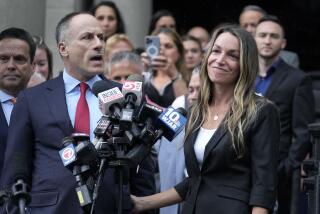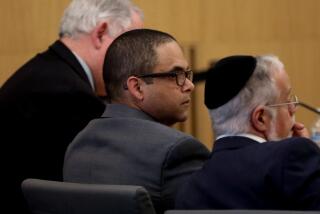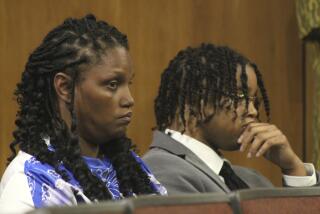Penalty Phase of Charles Trial Ends in Deadlock
- Share via
SANTA ANA — A judge declared a mistrial Thursday after a jury deadlocked one vote short of condemning a 23-year-old Fullerton mechanic to death for the murder of his parents and younger brother.
Edward Charles III took the news calmly and felt “very fortunate” that jurors, after deliberating nearly four days, were unable to decide on sending him to California’s death row, one of his attorneys said.
Jurors were far more animated in their reactions. Lingering in the courthouse corridors hours later, several panelists expressed frustration that a lone dissenting vote could leave the emotion-charged trial unfinished. Several said a dissenting juror withdrew from the group with her arms crossed as deliberations wore on and seemed unable to cope with the life-or-death decision.
“It was just about the worst experience you can think of,” said juror Shirley Feller, 64, a Westminster resident. “It was one of the hardest things I have ever gone through my entire life. . . . I feel like we disappointed the family members that died. We let the victims down.”
Orange County Superior Court Judge Everett W. Dickey set a March 1 hearing to give prosecutors time to decide if they want to retry the penalty phase of Charles’ trial. If the prosecution does not seek another trial, Charles would receive a sentence of life in prison with no parole, instead of the death penalty.
“Obviously, it’s always hard for a prosecutor to be that close,” Deputy Dist. Atty. David Brent said after jurors deadlocked 11 to 1. “I know that these jurors worked hard to come up with a just verdict. I wished we could have had a unanimous verdict, but I understand that’s not always going to happen.”
The same jury had found Charles guilty of first-degree murder for stabbing and bludgeoning his father and of second-degree murder for the apparent strangulation of his mother and stabbing and bludgeoning death of his brother.
All three were killed after a Sunday dinner in the family’s home in the affluent Sunny Hills area of Fullerton, and their bodies were found Nov. 7, 1994, in a flaming car parked at a La Mirada school.
The defendant’s 74-year-old grandfather, who lived with the family and had slept through the killings, said Thursday that he was “distraught” over the mistrial, although he said he had no feelings one way or the other on what sentence his grandson should receive.
“My biggest concern was that the trial would be over,” said Bernard Severino, who is still living at the home of his slain family. “I don’t want to go through another year of this.”
*
Severino said he has not spoken to his grandson in at least eight months, although he has been thinking lately about trying to contact him, to ask the question that has haunted him and others: “Why?”
“My curiosity is, like everyone else, why he did it,” said Severino, who said he has no doubt of his grandson’s guilt. “I thought he might talk to me.”
The first hint of a deadlock came Wednesday in a note jurors sent to the judge, according to court records.
The jury asked if a lone member could ask a question that the other jurors “do not choose to ask,” court records show. The judge answered yes, and a few minutes later, juror No. 2 asked what would happen in the event of a hung jury.
“To clarify, does the penalty phase . . . get turned over to a completely new jury or does it become the presiding judge’s decision?” the juror wrote, according to court documents. “Please, please respond. Most respectfully submitted, juror No. 2.”
The judge responded that he could not answer the query, and he cautioned the jury not to speculate about the consequences of a hung jury as they weighed the death penalty issue.
By the end of deliberations, the dissenting juror sat with folded arms and avoided eye contact, other jurors said Thursday. The dissenting juror could not be reached for comment.
Jury forewoman Emily Rowe, 46, of Mission Viejo, said that she believes the woman was not ready to make a decision that involved life or death, and she quoted the dissenting juror as saying she would agree to a death penalty only for “innately evil people.”
“And there was no evidence that Eddie was born evil,” Rowe said. “We tried to get her to explain her rationale, but she really couldn’t. It was about emotion. She gave more weight to the defense’s closing argument than the evidence given to us.”
Rowe said the holdout juror cited testimony from relatives who asked that Charles be spared the death penalty and noted that Charles had no previous criminal record.
*
Jurors heard emotional appeals during the penalty phase from Charles’ relatives, who testified that they had already lost three loved ones and could not endure losing another.
Attorneys for the defendant, often choked with emotion, said that the killings represented a complete “act of derailment” in Charles’ character and that life in prison without parole would be a harsh punishment for someone who had never been in trouble with the law.
Prosecutor Brent had said the death penalty would be an appropriate penalty, and he told jurors that someone who had obviously shown no mercy to his own family was not worthy of mercy from them.
Brent contended during the trial that Charles was driven by hatred when he killed his father, Edward Charles II, 55, a Hughes Aircraft engineer; his mother, Dolores, 47, a self-employed typist; and brother, Danny, 19, a promising opera singer and performer in his second year at USC.
Brent said Charles was jealous of his brother, faced disapproval from his parents over his girlfriend and had also argued with his parents over $50,000 he wanted from them to buy a gas station.
A portrait of a loving middle-class family torn by pride in Danny Charles and disappointment in Eddie Charles emerged during the trial, although neither side could pinpoint one thing that may have triggered the killings.
Deputy Public Defender Ronald Klar repeatedly told jurors that there was nothing wrong in the pride the parents took in their youngest son or the high standards they set for both boys. But the effect on Charles, an aspiring boxer who had dropped out of college, was a growing sense of “frustration and agony,” he said.
The prosecutor said the three victims were slain just a few hours after the family ate dinner together. The prosecutor told jurors that Charles sought to destroy the bodies in a car fire in La Mirada and concoct an alibi as part of repeated efforts to cover up his deeds.
After the slaying, Brent said, Charles telephoned from Orange County Jail asking his grandfather to take responsibility for the slayings and later wrote an incriminating letter that was to be used to make the killings look like a robbery.
The defense urged jurors to acquit Charles, contending that the prosecution had not proven its case. Defense attorneys told jurors that Charles did not write the incriminating letter, that it came from a jail inmate seeking special treatment from authorities. They acknowledged that it was “cold” for Charles to ask his grandfather to take the blame but told jurors the young man was confused and desperate at being jailed on a capital charge.
More to Read
Sign up for Essential California
The most important California stories and recommendations in your inbox every morning.
You may occasionally receive promotional content from the Los Angeles Times.













